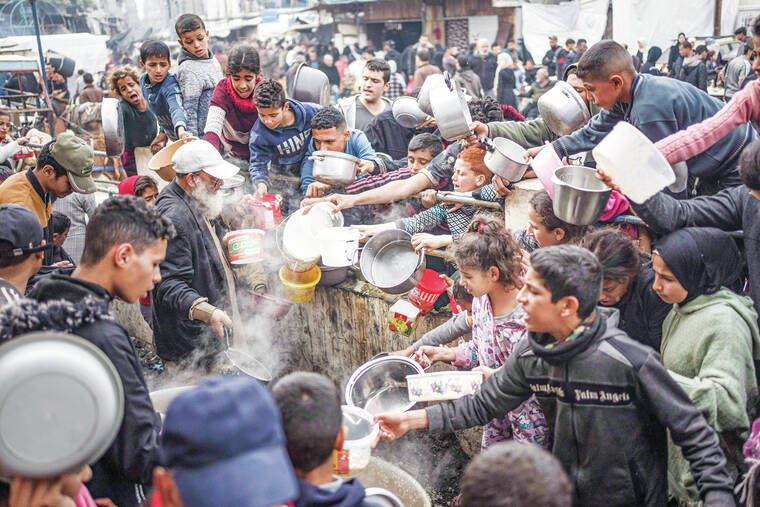UN says more than 1 in 4 people in Gaza are starving because of war
RAFAH, Gaza Strip — More than half a million people in Gaza — a quarter of the population — are starving, according to a report Thursday by the U.N. and other agencies that highlights the humanitarian crisis caused by Israel’s bombardment and siege on the territory in response to Hamas’ Oct. 7 attack.
The extent of the population’s hunger eclipsed even the near-famines in Afghanistan and Yemen of recent years, according to figures in the report. The report warned that the risk of famine is “increasing each day,” blaming the hunger on insufficient aid entering Gaza.
ADVERTISING
“It doesn’t get any worse,’’ said Arif Husain, chief economist for the U.N.’s World Food Program. “I have never seen something at the scale that is happening in Gaza. And at this speed.”
Israel says it is in the final stages of clearing out Hamas militants from northern Gaza, but that months of fighting lie ahead in the south.
The war sparked by Hamas’ deadly Oct. 7 rampage and hostage-taking in Israel has killed nearly 20,000 Palestinians. Some 1.9 million Gaza residents — more than 80% of the population — have been driven from their homes, and many of them are crammed into U.N. shelters.
The war has also pushed Gaza’s health sector into collapse. Only nine of its 36 health facilities are still partially functioning, all located in the south, according to the World Health Organization.
WHO relief workers on Thursday reported “unbearable” scenes in two hospitals they visited in northern Gaza: Bedridden patients with untreated wounds cry out for water, the few remaining doctors and nurses have no supplies, and bodies are lined up in the courtyard.
Bombardment and fighting continued Thursday, and internet and communications that had been knocked out for several days gradually began to return across the territory.
U.N. Security Council members are negotiating an Arab-sponsored resolution for a halt in fighting to allow for increased aid deliveries. A vote on the resolution has been postponed twice this week in the hopes of getting the U.S. to support it or allow it to pass after it vetoed an earlier cease-fire call.
Thursday’s report from the U.N. underscored the failure of weeks of U.S. efforts to ensure greater aid reaches Palestinians. At the start of the war, Israel stopped all deliveries of food, water, medicine and fuel into the territory. After U.S. pressure, it allowed a trickle of aid in through Egypt. But U.N. agencies say only 10% of Gaza’s food needs has been entering for weeks.
This week, Israel began allowing aid to enter Gaza through its Kerem Shalom crossing, which boosted the number of trucks entering from around 100 a day to around 190 on Wednesday, according to the U.N. But an Israeli strike Thursday morning hit the Palestinian side of the crossing, forcing the U.N. to stop its pickups of aid there, according to Juliette Touma, spokesperson of UNRWA, the U.N. agency for Palestinian refugees. At least four staff members at the crossing were killed, a nearby hospital reported. The Israeli military said it struck militants in the area.
Israeli President Isaac Herzog said Israel has been working to increase its inspection of aid trucks to 300 or 400 a day and blamed the U.N. for failures in delivery. The amount of aid could triple “if the U.N., instead of complaining all day, would do its job,” he said, without elaborating on what more the U.N. should be doing.
Egypt’s Rafah crossing has limited capacity for trucks to cross. U.N. officials say delivery of aid within much of Gaza has become difficult or impossible because of fighting, and more than 130 U.N. personnel have been killed.
The report released Thursday by 23 U.N. and nongovernmental agencies found that the entire population in Gaza is in food crisis, with 576,600 at catastrophic — or starvation — levels. “It is a situation where pretty much everybody in Gaza is hungry,” Husain, the World Food Program economist, said.
“People are very, very close to large outbreaks of disease because their immune systems have become so weak because they don’t have enough nourishment,” he said.





